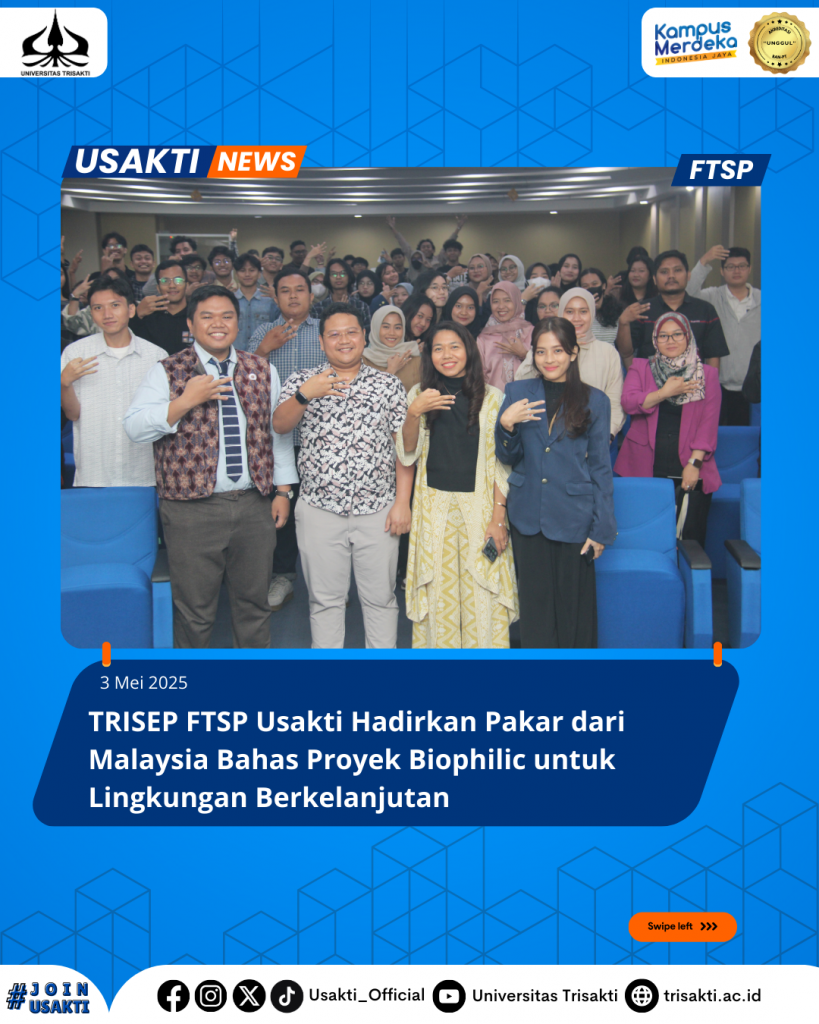Contact Us
- JL. Kyai Tapa No. 1 Grogol
- Jakarta Barat, Indonesia
- Phone:
- (62-21) 566 3232
- Whatsapp:
- (+62) 882 194 856 74
- (+62) 877 707 077 03
- Fax: (62-21) 564 4270
- Email: humas@trisakti.ac.id

Jakarta, May 3, 2025 – The Faculty of Civil Engineering and Planning (FTSP) at Universitas Trisakti has once again held the Trisakti International Student Exchange Program (TRISEP), featuring international guest lecturer Ts. Dr. Khairul Zahreen Mohd Arof from UCSI University, Malaysia. The event, titled “Biophilic Projects in Malaysia: Integrating Nature for Sustainable Built Environments,” took place on the 9th floor of Building C, FTSP Usakti.
The event was officially opened by the Dean of FTSP Usakti, Dr. Ir. A. Hadi Prabowo, MT, who emphasized the importance of international collaboration in advancing knowledge and sustainable planning practices. He also highlighted that this program is part of FTSP’s ongoing efforts to strengthen its global academic network.
Moderated by Ir. M. Sapto Nugroho, ST., MT., the event was attended by the Vice Dean IV of FTSP Usakti, Dr. Lisa Oksri Nelfia, ST., MT., M.Sc, along with faculty members and students from various academic programs. The discussion was notably interactive, particularly during the exploration of biophilic design applications in the built environment.
In his presentation, Dr. Khairul Zahreen elaborated on the concept and implementation of biophilic projects, drawing on the framework by Kellert and Calabrese (2015). This framework encompasses three core categories: direct experience of nature (such as light, air, water, plants, and animals), indirect experience of nature (such as natural forms, colors, and biomimicry), and experience of space and place (including cultural and ecological attachment to a location).
He also outlined six key elements in developing biophilic projects: (1) environmental features; (2) natural shapes and forms; (3) natural patterns and processes; (4) light and space; (5) place-based relationships; and (6) evolving human-nature connections.
As part of the program, a cooperation agreement was signed between the Faculty of Civil Engineering and Planning at Universitas Trisakti and UCSI University, Malaysia. This partnership marks the beginning of a long-term academic collaboration, which will include faculty exchanges, joint research, and the development of international curricula.
The event was free of charge, open to both faculty and students, and participants received e-certificates. TRISEP serves as a tangible demonstration of FTSP Usakti’s commitment to fostering internationally-oriented education and expanding the global perspective of its academic community.




